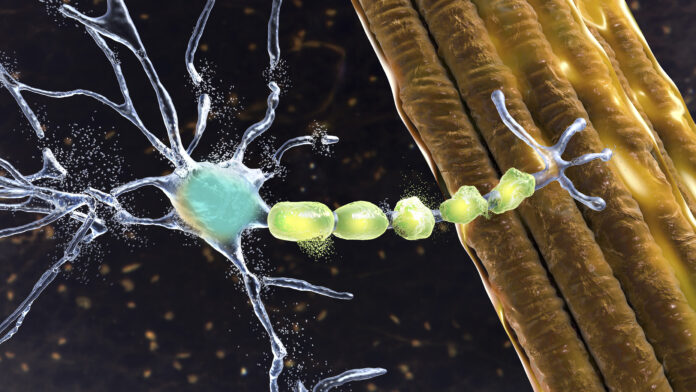
Research led by Oregon Health and Science University and Stanford University School of Medicine suggests blocking a protein known as alpha-5 integrin could have therapeutic potential for treating the fatal neurological disease amyotrophic lateral sclerosis (ALS).
When the researchers gave a monoclonal antibody that blocks alpha-5 integrin activity to mice with ALS it led to better motor function, delayed disease progression and increased survival time in the animals.
This drug pathway is already being tested to treat cancer and although this work is early stage, the researchers believe it could also have potential to treat people with ALS in the future.
“When we blocked its expression in mice, we were able to slow down the disease,” said co-lead author of the PNAS paper, Bahareh Ajami, assistant professor of molecular microbiology and immunology and behavioral neuroscience in the OHSU School of Medicine, in a press statement. “We hope that it will get to the clinic very soon.”
ALS is a rare neurological condition affecting around 18,000 people in the U.S., with about two new cases per 100,000 people recorded per year. It manifests as progressive deterioration of the upper and lower motor neurons and is eventually fatal with no cure or long-lasting treatments available, although a number are in development.
Ajami and colleagues report that alpha-5 integrin is present in higher-than-normal amounts in the motor pathways in the central and peripheral nervous system in post-mortem tissue from people with ALS. They also found a similar accumulation of this protein in the neurons of a mouse model (SOD1G93A) of ALS. The protein was also high in microglial cells and macrophages in these samples, both types of immune cell known to be linked to ALS progression and motor neuron degeneration.
Anti-alpha-5 integrin antibodies are in development for various purposes. The team tested an antibody, known as MFR5, which is being developed by a biotech company in the U.S. called Pasithea Therapeutics, to see if it could improve symptoms of ALS in these mice.
The mice were injected with MFR5 twice weekly from week 8 until late-stage disease. The animals given this antibody had improved motor function and increased survival time after being given this candidate therapy compared with mice that were not.
“At this point, we cannot say it’s a cure but it’s a very interesting start,” said Ajami. “It may be similar to what immunotherapy did for cancer or will do for Alzheimer’s by targeting immune cells.”
The researchers now want to continue to test MFR5 in mice and evaluate dose-response in more depth before progressing to clinical studies.
Pasithea is working on drug candidates for several neuroinflammatory central nervous system disorders. It’s lead candidate is currently for neurofibromatosis Type 1, but also wants to progress its anti-alpha-5 integrin for ALS and is also looking to develop treatments for multiple sclerosis and schizophrenia.













